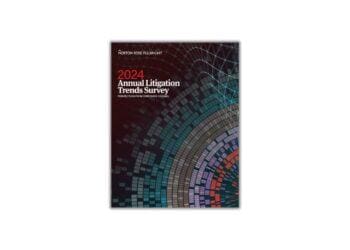Reputation has always been a catalyst for company success, but the attention it now demands in our culture is of a critical nature as a driver of competent risk management. Still, it is being undervalued in practice. Michael Toebe discusses the disconnect.
Follow the media closely; shortcomings are more frequent than you might imagine. New research is also providing evidence that not all companies and executives yet fully understand the connection between and the realities of reputation and risk.
It affects financial safety and growth in the market, business relationships, media beliefs and the career well-being of an organization’s highest-ranking leaders.
The gap in belief between what is true, evident and helpful and what is assumed was eminently and surprisingly clear in the findings released recently by the firm Weber Shandwick, in partnership with KRC Research, in their collaborative survey, “The State of Corporate Reputation in 2020: Everything Matters Now.”
Global executives (and boards of directors) are exhibiting blind spots and dangerous overconfidence about the risk of a lower standard of reputation in our cultural environment, a mindset that has proven to increase the risk of conflicts, crises and scandals.
According to the survey, while executives have learned that an average of 63 percent of their company’s market value is attributed to the company’s full reputation, their decisions and actions reflect a lack of cognizance of the risks they are assuming.
Two initial impressions of this finding: first, the significance of the percentage value; second, executives realizing that strengths in some areas of the organization don’t automatically translate to a strong reputation overall – one that is helpful for laying a foundation for intended outcomes, driving opportunities and achievements, providing protection along the way and satisfying the ultimate mission.
There are still leaders who are ignorant or in denial about this fact, but more and more are becoming knowledgeable, making wiser decisions, managing risk in an improved manner and not seeking excuses for neglecting numerous drivers of reputation.
Executives in this survey believe there are some two dozen drivers of reputation that affect their ability to perform and accomplish best outcomes. But do these same leaders and decision-makers sufficiently value all of the drivers, or is clarity and thorough understanding lacking?
Looking at the list of “Factors That Contribute to Company Reputation,” it’s clear there are problematic assumptions, inaccurate beliefs and misguided mindsets, all of which likely result in lower decision quality and higher-risk practices when it comes to constantly building, nurturing and proactively protecting reputation.
For example, only 53 percent of executives believe governance contributes to reputation. Have the other 47 percent not learned from the highly public errors, crises and scandals of others and the negative impact on reputation? (See Boeing, Wells Fargo, Uber, Johnson & Johnson, Michigan State University, Facebook and Google to name a few.)
Other mind-benders:
- Only 56 percent believe or “know” the quality of the CEO or chair contributes to reputation well-being.
- Only 58 percent believe ethics and values are a reputation variable.
- Just 60 percent consider reputation tied to the safety of products and services, 61 percent to the quality of customer service, 63 percent to the quality of employees and 63 percent to the quality of products and services.
Think for a moment on those numbers and how low they are as considerations for what executives around the world believe are (and are not) entirely important for their organization’s reputation. Why is this problematic? The outcomes become customers’ dissatisfying, negative or painful experiences, and those expectations, experiences and perceptions directly determine reputation.
People have an easier way to express their voice in modern society. It’s not a private phone call, navigating the customer service gatekeepers or mailing letters that might go undervalued or ignored. And it’s not hoping the media finds dissatisfaction or anger newsworthy.
Social media has changed the dynamic. The media pays attention and will more frequently pursue and produce stories with a bent reputation. Stories can and do go viral, and negative news from the media or the public travels through social media at an alarming speed.
Leaders are not making the connection between faulty mindsets and lowered (or low) standards, the acceleration of negativity and the costs when details, human interactions, process, governance and compliance are compromised. And the sample size of this survey is not small; it included “2,227 executives in high-revenue companies across 22 markets worldwide.”
Facts and evidence are not consistently ruling the day in the minds of leaders. Otherwise, problems would be rarer. Biases, false beliefs, lack of self-control and miscalculated risk are not in alignment with what society expects. Immediate attention and psychological rewiring are needed for improved management of reputation risk in order to steer clear of the iceberg of consequences – tangible and intangible – including career damage.
Will boards of directors and executives be receptive to the poise and ego suppression needed to increase their insight into current and developing realities and to adjust some strongly held beliefs that are contrary to the evidence?
While the narrative in organizations has often been that adversity is a rare exception and difficult to prevent, the research says differently. “Most reputational crises are self-inflicted. Among the global executives who report that their firms experienced a crisis in the past two to three years that impacted their reputations, a staggering 76 percent claim that the crisis was preventable.”
If that statistic is accurate (it is), why were the mindset, practices and safeguards not in place to conduct those organizations in a way that prevented crisis? Was this recognition of the importance of prevention merely hindsight? The statistic seems to indicate not; it was knowable.
What seems common sense to leaders today regularly proves to be uncommon thinking, decision analysis, decision-making and decision quality. This survey point, also a head shaker: “Nine in 10 executives (91 percent) say their company’s reputation is important to their board of directors, with about half (52 percent) reporting it to be very important to the board.”
What does it say that reputation is not important, critical and deserving of full attention daily to 100 percent of any board of directors? Why do “only” 91 percent believe it to be important and merely 52 percent believe it to be very important?
Those questions might seem unnecessary, but the details are worth examining daily and in depth to advance the organization’s mission, including protective commitments to ethics, governance and compliance by boards and executives.
What questions are boards and executives not asking that they should be? What answers are they not finding that they must? What adjustments in beliefs need to happen, and how do boards and executives cross the bridge from here to there?
Finding those answers will reveal how effectively reputation is being built and to what level of quality. They will reveal the degree to which the landscape is receptive. They will reveal how well reputation is being protected, how much of a capital asset it becomes, whether it can grow strong enough to enable access to new opportunities and to act as a reliably protective measure.
A well-built, nurtured and respected reputation denotes good organizational health; it is a strong currency that helps leaders to safely navigate risk management, protect opportunities and benefit from a more welcoming market. Landmines are avoided.
This happens with higher personal self-awareness, organizational self-awareness, higher standards for reputation and understanding of what builds reputation into “unquestionably trustworthy” territory, to the point the company’s reputation becomes a symbol of its business character.
On the contrary, low standards and misguided beliefs that are in disagreement with cultural expectations points to a damaged or poor reputation, inviting scrutiny, anger, resentment, criticism and consequences from the media, the public and even the government.
This equates to poor organizational health – a weak currency to accomplish the company’s overall mission.



 Michael Toebe is a reputation specialist who serves individuals and organizations. He regularly writes on communication, ethics, governance, conflicts, scandal, reputation and crisis. He is the writer of “Red Diamonds Essays” and “Reputation Specialist Essays,” both on the Medium platform.
Michael Toebe is a reputation specialist who serves individuals and organizations. He regularly writes on communication, ethics, governance, conflicts, scandal, reputation and crisis. He is the writer of “Red Diamonds Essays” and “Reputation Specialist Essays,” both on the Medium platform.







